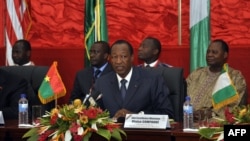West African regional foreign ministers are scheduled to meet Monday to review recommendations by defense chiefs for deploying troops to Mali, where Islamist militants control the north.
Sonny Ugoh, communications director of the Economic Community of West African States (ECOWAS), says the ministers will also consider imposing stiff sanctions on members of the former military junta. Ugoh said they appear to be influencing Mali’s interim government.
“The meeting of the [ECOWAS] Mediation and Security Council is a follow up of the chiefs of the defense staffs’ roadmap for deployment in Mali,” Ugoh said. “The ministers will look at it and then review the situation in Mali within the context of the invitation of ECOWAS to come and assist the government to restore the territorial integrity of the country, particularly [in] relation to the issues in the north.”
The Mediation and Security Council will also be updated on the current situation in Mali.
“They [will] be given a comprehensive briefing on what has happened since their last meeting, and then they will take that on board along the report of the chiefs of defense staff. Then they [will] be able to make a couple of recommendations on how the process can be taken forward,” said Ugoh.
He said ECOWAS is waiting for the U.N. Security Council meeting before deciding on the date for troop deployment.
“We still have the issue of the U.N. Security Council mandate outstanding and as soon as we get that it becomes easier to put a timeline when deployment will take place,” Ugoh said.
He said Mali’s government and regional officials are discussing exactly where and how ECOWAS forces would be deployed.
“There are divergent views based on the pronouncements we’ve heard from the government in Mali and the region," he said. "The mandate of the force is very clear: to support them in protecting [government] institutions in the capital, to build the capacity of the armed forces of Mali and their security services, and to support them [in restoring] their territorial integrity.”
Ugoh said that both Mali and ECOWAS lost valuable time in resolving the security crisis in the West African country. Islamist groups reportedly linked to al-Qaida now control about two-thirds of Mali's national territory.
The Islamists, along with Tuareg separatists, seized control of the north in April after the coup in Bamako in March. Since then, the militant groups Ansar Dine and Movement for Oneness and Jihad in West Africa have moved to enforce a strict version of Islamic law.
Sonny Ugoh, communications director of the Economic Community of West African States (ECOWAS), says the ministers will also consider imposing stiff sanctions on members of the former military junta. Ugoh said they appear to be influencing Mali’s interim government.
“The meeting of the [ECOWAS] Mediation and Security Council is a follow up of the chiefs of the defense staffs’ roadmap for deployment in Mali,” Ugoh said. “The ministers will look at it and then review the situation in Mali within the context of the invitation of ECOWAS to come and assist the government to restore the territorial integrity of the country, particularly [in] relation to the issues in the north.”
The Mediation and Security Council will also be updated on the current situation in Mali.
“They [will] be given a comprehensive briefing on what has happened since their last meeting, and then they will take that on board along the report of the chiefs of defense staff. Then they [will] be able to make a couple of recommendations on how the process can be taken forward,” said Ugoh.
He said ECOWAS is waiting for the U.N. Security Council meeting before deciding on the date for troop deployment.
“We still have the issue of the U.N. Security Council mandate outstanding and as soon as we get that it becomes easier to put a timeline when deployment will take place,” Ugoh said.
He said Mali’s government and regional officials are discussing exactly where and how ECOWAS forces would be deployed.
“There are divergent views based on the pronouncements we’ve heard from the government in Mali and the region," he said. "The mandate of the force is very clear: to support them in protecting [government] institutions in the capital, to build the capacity of the armed forces of Mali and their security services, and to support them [in restoring] their territorial integrity.”
Ugoh said that both Mali and ECOWAS lost valuable time in resolving the security crisis in the West African country. Islamist groups reportedly linked to al-Qaida now control about two-thirds of Mali's national territory.
The Islamists, along with Tuareg separatists, seized control of the north in April after the coup in Bamako in March. Since then, the militant groups Ansar Dine and Movement for Oneness and Jihad in West Africa have moved to enforce a strict version of Islamic law.





